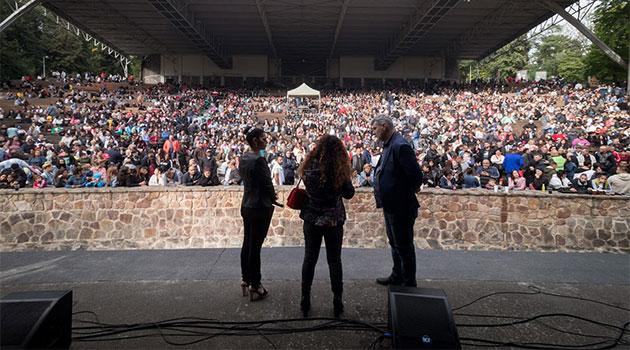The "Czech Nightingale" pop music survey returns with improvements, Romani musicians are in the lineup, write-in candidates also possible

The popular music survey “Czech Nightingale” (Český slavík) has been revived and the announcement of the winners will be broadcast live on 19 November from the Karlín Musical Theater in Prague. The survey is returning to the music scene after a four-year hiatus with a new voting sructure designed by Karel Janeček, the entrepreneur and mathematician who is the president of the survey’s new entity, Český slavík 21.
Members of the public will be able to vote with the aid of the D21 system, the organizers have announced to the press. Voting has launched and will be underway until midnight on 5 November through the Decision 21 platform.
People can aso vote at the website hlasovani.ceskyslavik.cz. Several Romani performers are included among those to vote for.
The previous voting system for the popular music survey allowed voters to gave their first-place choice three points, their second-place choice two points and their third-place choice one point. “The principle of the D21 voting is that each voter has many votes. Specifically in Český slavík 21, those voting can choose between as many as five performers to whom to give their vote. What is important in the D21 system is that each voter is able to express his or her preferences with the same amount of weight, which acts as unifying force in society. This is especially important in politics, where the ability to cast preferential ballots means that candidates who divide society are not likely to receive second and third preferential votes. That means unifying candidates have a chance at winning, those who are able to get preferential votes from those who otherwise have selected somebody from another party as their main choice,” Janeček, who authored the weighted voting method in 2013, told the Czech News Agency.
“I decided to revive Český slavík to help the Czech music scene, which was suffering from the exaggerated and irrational restrictions previously in place, and because of which many artists and musicians were actually suffering, as were our children,” Janeček. “Another thing is that three years ago it seemed a great shame to me that the biggest nationwide pop music survey, the name of which was invented more than 60 years ago by Ladislav Smoljak, had collapsed just because of a poorly-designed voting system. Nothing like that would have happened if the D21 voting system had been in place,” he said.
Those interested are able to vote in the survey, as before, in the categories of Female Singer, Male Singer and Group, with a new category of Hip Hop & Rap. Another innovation is that voters can give their votes to as many as five performers in any category, or they can give all five of their votes just to their favorite.
The results will all then be calculated. In the popularity survey, people can vote for several Romani performers this time.
In the category of Female Singer the Romani performers are Monika Bagárová, Martina Balogová and Lucie Bikárová. In the category of Male Singer the organizers have chosen to include Jan Bendig, Jan Cina, Vlasta Horváth and Radek Banga.
In the category of groups the Romani band Terne čhave has been included. However, the competition organizers are also making it possible to vote for a performer who is not on the list.
All one has to do is input the name into the online form and the performer will be added. As of 6 November the voting will begin in the category Discovery of the Year, and voting on that category will be held until midway through the live television broadcast of the awards ceremony on TV Nova.
Aleš Háma and Ondřej Sokol will moderate the ceremony. “During the gala evening there will be performaces by the band Kryštof, for example, and by Ewa Farna, Marek Ztracený and Tomáš Klus. The survey is inextricably linked with the late Karel Gott, and the performers will have his legacy in mind,” said the director of Český slavík 21, Jakub Horák.
“When I learned that my beloved competition was going to start up again, I had mixed feelings. Many of us associate Český slavík with Karel, and I thought that a brand new contest should begin. However, then I said to myself that people aren’t getting exposed to music these days. Thanks to this survey, better times are ahead for culture,” commented the singer Lucie Bílá, who has won 20 of these particular audience surveys.
The statuettes given to the winners will also be new and were designed by Viktorie Beldová and Lilia Khousnoutdinova. They are being produced by Granát, an arts cooperative in Turnov.
The producer of the audience survey is the Musica Bohemica agency and the general partner is Karel Janeček, who owns most of the shares there now. The post of director has been taken up by the producer Jakub Horák, replacing Jaroslav Těšínský.
Těšínský produced the annual pop music survey for 22 years and will continue to be an honorary director of the competition. This year marks the 23rd Český slavík survey; it was preceded during communism by 30 years of a popular music survey called “Golden Nightingale” (Zlatý slavík).
The most recent such award was given on 25 November 2017 and is especially associated with the singer Karel Gott, who won a total of 30 “Nightingales”, both “Golden” ones and “Czech” ones, and who passed away in 2019. The survey had been accompanied by controversies of different kinds in recent years, e.g., concerning alleged manipulation of the votes being cast.
In the year 2016, one year before the competition’s 22nd year in 2017, after which it went on hiatus, Tomáš Ortel and his band, Ortel, drew attention when they won second place. The band has been associated with the ultra-right and critics reproach it for its xenophobic lyrics targeting minorities.
